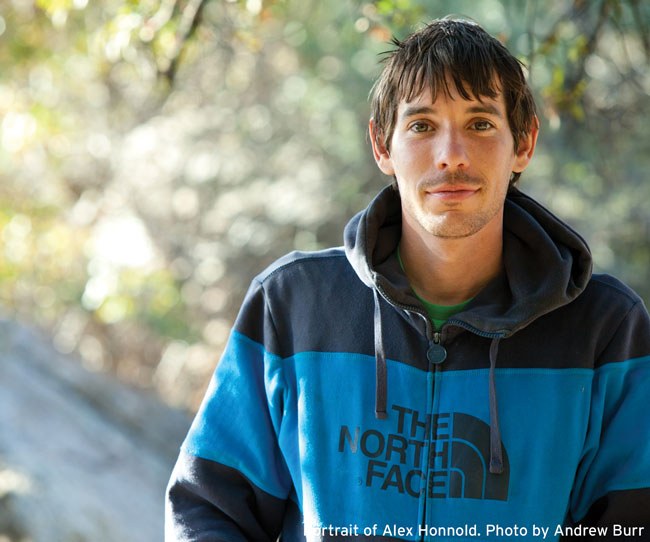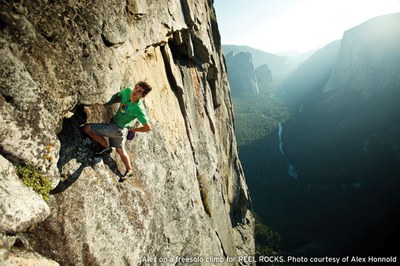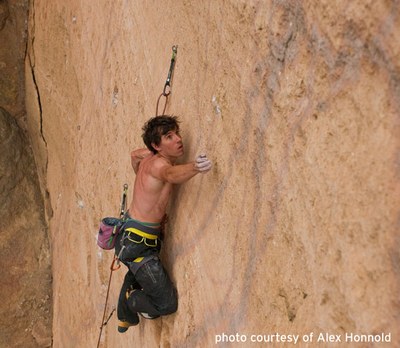
by Suzanne Gerber, Publications Manager
Alex Honnold was on an academic and expected track – at least for the type of lifestyle he grew up in. Before his international climbing career, he was at the top of his class in a prestigious high school in Sacramento, California. Berkeley was his next step, with engineering as his major.
However, his heart wasn’t in his classes – it was at the crags and on the rock faces in national parks. When his father died, a year into college, Alex re-evaluated his path in life. His father was the one who had taken him to a rock gym for the first time and spent countless hours patiently belaying him through grade school. He was also the one who pushed Alex to go to college. So after one year at Berkeley, Alex decided to leave school and take to the road with his climbing gear (along with his mom’s approval) to explore the country “Fred Beckey style.” This opportunity to follow his passion was one he couldn’t resist.

Creating a niche
Alex made a name for himself – not by being loud and competitive, but by being focused and capable. He caught the attention of notable climbers, climbers who inspired him, simply by being out there and doing what he loves. This past April, he was awarded a 2014 Piolet d’Or, along with Tommy Caldwell, for a full traverse of the Fitz Roy massif. Over the course of five days, the duo climbed seven famous Patagonia summits with 13,000 feet of collective vertical gain. It was the first time it had ever been done. When he got back to civilization — at least to the part of Patagonia where climbers hang out and plan their next adventure — he met up with Northwest favorite, Colin Haley. Together, they came very close to completing a one-day Torre Traverse — over Cerro Standhardt, Punta Herron, Torre Egger, and Cerro Torre. Harsh winds forced them to turn around just two pitches below the final summit.
Recognition for Alex didn’t start with his alpine ascents and traverses though. He’s best known for his free solos of big walls —which he completes with record speed. Of course, he doesn’t have ropes and safety gear to slow him down. He soloed Yosemite’s Triple Crown – Mt. Walkins, El Capitan and Half Dome — in less than 19 hours, free-climbing 90% of the way in 2012. A few weeks later, he teamed up with Hans Florine and the two broke the record for speed climbing the Nose of Yosemite’s El Capitan.
Alex is known for one other notable, or rather, noble accomplishment: his charity work. Three years ago, Alex started the Honnold Foundation, which focuses on bringing clean energy to impoverished communities around the globe. His climbs have brought him to developing countries like Chad and Namibia and opened his eyes to the daily struggles of so many who simply can’t afford basic amenities – a stark contrast from his southern California upbringing. Not only does he appreciate opportunities that he has come across in life, but he knows how to share them.
“I have this opportunity,” says Alex. “I may as well try to use it. To do as much as possible. I wouldn’t call it a moral obligation, but it’s something I’m able to do.”
When I interviewed Alex, I was impressed, but not surprised, by how well-read he is. When not climbing and socializing (or being interviewed), he’s reading. His main focus right now is the same as it’s been for years: environmental non-fiction. It helped spur his foundation and his interest in solar-powered energy.
I asked why he picked solar. “It seems the most striking and obvious solution to environmental issues like climate change,” Alex explains. “But it also helps transparent issues like lifting people out of poverty and closing the equality gap. It just seems like a nice way to help the world, and also help these people. And the thing is — especially in the third world — nobody cares about environmental issues because they’re too worried about their actual life. Or they’re too worried about meeting their basic needs and caring for their family and all those sort of things. So, it’s good way to try and solve both issues at the same time.”
Two birds with one stone. I like it. And as Alex points out, “that’s a big part of climbing too. I love efficiency and doing things right. Doing things cleanly.”
Alex likes to get the most out of anything he puts his mind to. That’s another reason he decided to start a foundation now, rather than later. Part of his inspiration came from climber Ron Kauk – who Alex calls “an icon of the last generation.”
“He started this nonprofit called Sacred Rok, which takes underprivileged kids from the local community and brings them on backpacks and day trips to teach them life skills, and gives them access to the outdoors,” Alex explains. Ron created his nonprofit after he retired from climbing, and Alex thought to himself, “if he started that when he was in his prime, and just devoted a little bit of attention to it, he could have turned it into something bigger. And I don’t know if he cares about that or if those were his interests, but I saw it as ‘I should start my foundation now, so that when I’m older and I’m even more passionate about that kind of stuff, it will already be in place.’”
So Alex put together his foundation – on somewhat of an experimental level – based on his own interests and passion in clean energy. “I’m three years in and I told myself, I’d do five years and see what it’s all about. And it’s pretty awesome.” It’s not his main focus right now, but it’s been able to grow organically with the help of others. The tagline is “improving lives through sustainability.”
It’s not all hands-off for Alex either – he’s been known to install a solar panel or two. He even pulled his Sufferfest adventure partner, Cedar Wright, into a project with him in the Kayenta Region of the Navajo Nation. For this one, Alex’s foundation partnered with Elephant Energy to install solar power systems into homes and solar lights into schools. It was documented in Cedar and Alex’s Sufferfest tour which brought them to California, where the duo climbed all the 14’ers there, commuting between on bikes. Taking part in an environmental project was a good way to end their second biking tour, climbing iconic desert towers in the Southwest. Of his foundation work, Alex said, “I’m definitely getting into it more and more. I mean, by the time I’m 40, I’ll be really psyched on this kind of thing. We’ll see what happens by then. The foundation will sort of have a life of its own. If nothing else, there’s no harm in trying.”

Inspiring the future
There’s no better validation to a decision made to drop out of Berkeley than your high school calling up requesting an inspiring speech about your life. And Alex’s school did just that. “My high school teacher asked me to come back and tell the students that they didn’t need to go to college to be successful.” But Alex added, “That’s because the program I went through in high school churns out Ivy League kids. Their parents are ultra-high pressure and you know ALL kids are going to become doctors and stuff. So, my teacher just wanted me to put it out there that you don’t HAVE to go to college, to do something with yourself. As long as you’re motivated and working hard and follow that in different directions.”
So Alex went back to his hometown of Sacramento and gave a travel slide-show about climbing around the world to let the students know there are other options in life. “The thing is,” he said, “I really value the education I got in high school – it was super-good for me, but I wish I hadn’t gone to college at all. I kind of wasted one year of my life.”
From a man who lives for efficiency, those are strong words – but Alex has made up for lost time – achieving more than most do in a lifetime, at 29.
He even has a book coming out this fall about his life, titled “Alone on the Wall.” It’s coauthored by writer and climber, David Roberts. “He took everything I’ve ever written,” Alex said, “and then decided it was best to split the book into a two-person — a narrator voice, which is him, and my voice. He felt that my voice doesn’t really explain how big or rad any of the climbs are or anything. He felt like I needed some sort of third-person voice to put things into proper perspective.”
Alex might understate the nature of his climbs, but he certainly has a good perspective of the world. In brainstorming what to write for this article, I was originally going to say that Alex is a trailblazer for the next generation. Then I realized, I am just hoping that he will be. Not only did he step out of a traditional path to follow his passion, free-soloing walls nobody thought possible, breaking speed records and traversing iconic alpine ranges, he’s found ways to help make the world a better place along the way.
If you want to learn more about the projects that Alex’s foundation takes part in, or find out how to help, go to honnoldfoundation.org. To learn more about his upcoming book, go to www.alexhonnold.com/aloneonthewall.
This article originally appeared in our July/August 2015 issue of Mountaineer magazine. To view the original article in magazine form and read more stories from our bi-monthly publication, click here.
 Suzanne Gerber
Suzanne Gerber